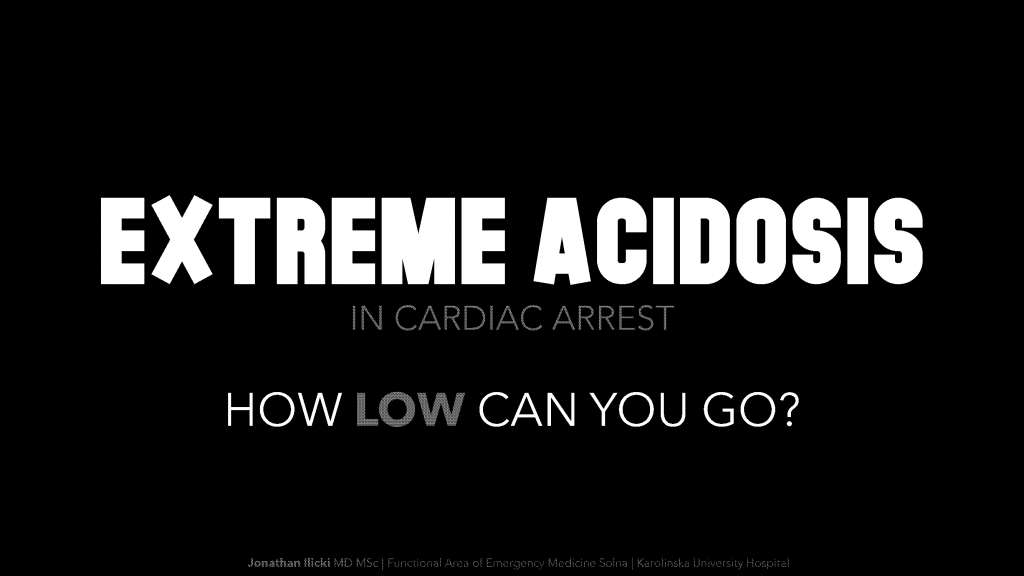
How low a pH can the human body handle? How bad is acidosis in cardiac arrest? Is there any point attempting to resuscitate a cardiac arrest patient with a pH of 6.8?
In this lecture from #SWEETs17, Jonathan Ilicki presents a poem covering cardiac arrest physiology, acidosis and the extreme boundaries of the human body. Discover what acidosis does to the human body and how low we can go!
UPDATE
Chris Turner contacted us in the comments to let us know about what seems to be the world record in extreme acidosis (pH 6,27) in survived cardiac arrest. Unfortunately, that case wasn’t identified prior to the lecture and was therefore not included. The case lives here.
And in the words of Chris himself: “There may be more…”
Video
Podcast
Slides
About Jonathan
- Emergency Medicine Resident, Clinical Innovation Fellow. EM resident at Karolinska, Stockholm. Special interest in arrestology and EBM. Find him on linkedin. Email: j dot ilicki at gmail.
- More content on his youtube channel
- He promises to be on twitter soon…
Credits
- Swedish Emergency Talks 2017 (www.sweets.nu/en)
- Johan Smedbäck (recording), Therese Djärv & Susanne Rysz (peer review)
- Music: Decktonic (http://freemusicarchive.org/music/Decktonic)
More from SWEETs17
Stay tuned for more talks from SWEETs17 here on scanFOAM. Also, make sure to follow the SWEETs team on twitter.
References
- Gaskell WH. On the Tonicity of the Heart and Blood Vessels. The Journal of physiology 1880; 3: 48–92.16. [PubMed]
- LEDINGHAM IM, NORMAN JN. Acid-base studies in experimental circulatory arrest. Lancet
(London, England) 1962; 2: 967–9. [PubMed] - Edmonds-Seal J. Acid-base studies after cardiac arrest. A report on 64 cases. Acta
anaesthesiologica Scandinavica Supplementum 1966; 23: 235–41. [PubMed] - Soler NG, Bennett MA, Fitzgerald MG, Malins JM. Successful resuscitation in diabetic ketoacidosis: a strong case for the use of bicarbonate. Postgraduate medical journal 1974; 50: 465–8. [PubMed]
- Orringer CE, Eustace JC, Wunsch CD, Gardner LB. Natural history of lactic acidosis after grand-mal seizures. A model for the study of an anion-gap acidosis not associated with hyperkalemia. The New England journal
of medicine 1977; 297: 796–9. [PubMed] - Weil MH, Rackow EC, Trevino R, et al. Difference in acid-base state between venous and arterial blood during cardiopulmonary resuscitation. The New England journal of medicine 1986; 315: 1616–8.
[PubMed] - Bozzuto TM. Severe metabolic acidosis secondary to exertional hyperlactemia. The American journal of emergency medicine 1988; 6: 134–6. [PubMed]
- Martin GB, Nowak RM, Cisek JE, Carden DL, Tomlanovich MC. Hyperkalemia during human cardiopulmonary resuscitation: incidence and ramifications. The Journal of emergency medicine 1989; 7: 109–13.
[PubMed] - Seguchi M, Jarmakani JM. Effect of respiratory acidosis on hypoxic newborn myocardium. Journal of molecular and cellular
cardiology 1989; 21: 927–34. [PubMed] - Shapiro JI. Functional and metabolic responses of isolated hearts to acidosis: effects of sodium bicarbonate and Carbicarb. The
American journal of physiology 1990; 258: H1835-9. [PubMed] - Orchard CH, Cingolani HE. Acidosis and arrhythmias in cardiac muscle. Cardiovascular
research 1994; 28: 1312–9. [PubMed] - Opdahl H. Survival put to the acid test: extreme arterial blood acidosis (pH 6.33) after near drowning. Critical care
medicine 1997; 25: 1431–6. [PubMed] - Refsum HE, Opdahl H, Leraand S. Effect of extreme metabolic acidosis on oxygen delivery capacity of the blood–an in vitro investigation of changes in the oxyhemoglobin dissociation curve in blood with pH values of approximately 6.30. Critical care medicine 1997; 25: 1497–501.
[PubMed] - Warner OJ, Palazzo FF, Ward ME, Waldmann C. Survival after cardiac arrest with a pH 6.6. Resuscitation 2001; 49: 213–5.
[PubMed] - Aufderheide TP, Sigurdsson G, Pirrallo RG, et al. Hyperventilation-induced hypotension during cardiopulmonary resuscitation. Circulation 2004; 109: 1960–5.
[PubMed] - Makino J, Uchino S, Morimatsu H, Bellomo R. A quantitative analysis of the acidosis of cardiac arrest: a prospective observational study. Critical care (London,
England) 2005; 9: R357-62. [PubMed] - Spencer C, Randic L, Butler J. Survival following Profound Lactic Acidosis and Cardiac Arrest: Does Metformin Really Induce Lactic Acidosis? Journal of the Intensive Care
Society 2009; 10: 115–7. [Source] - Funk G-C, Doberer D, Sterz F, et al. The strong ion gap and outcome after cardiac arrest in patients treated with therapeutic hypothermia: a retrospective study.
Intensive care medicine 2009; 35: 232–9. [PubMed] - Spencer C, Butler J. Survival after cardiac arrest and severe lactic acidosis (pH 6.61) due to haemorrhage. Emergency medicine journal : EMJ 2010; 27: 800–1.
[PubMed] - Di Rollo N, Caesar D, Ferenbach DA, Dunn MJG. Survival from profound metabolic acidosis due to hypovolaemic shock. A world record? BMJ case reports 2013;
2013. DOI:10.1136/bcr-2012-008315. [PubMed] - Ganga HV, Kallur KR, Patel NB, et al. The impact of severe acidemia on neurologic outcome of cardiac arrest survivors undergoing therapeutic hypothermia.
Resuscitation 2013; 84: 1723–7. [PubMed] - S F, F H, S W, W S, G P, G G. Prehospital measurement of arterial base excess and its role as a possible predictor of outcome after out-of hospital cardiac arrest.
Emergencias 2013; 25: 47–50. [Source] - Ncomanzi D, Sicat RMR, Sundararajan K. Metformin-associated lactic acidosis presenting as an ischemic gut in a patient who then survived a cardiac arrest: a case report.
Journal of medical case reports 2014; 8: 159. [PubMed] - Paz Y, Zegerman A, Sorkine P, Matot I. Severe acidosis does not predict fatal outcomes in intensive care unit patients: a retrospective analysis. Journal of critical
care 2014; 29: 210–3. [PubMed] - Williams KB, Christmas AB, Heniford BT, Sing RF, Messick J. Arterial vs venous blood gas differences during hemorrhagic shock. World journal of critical care
medicine 2014; 3: 55–60. [PubMed] - Smith SW. Cardiac arrest, severe acidosis, and a bizarre ECG. 2015. http://hqmeded-ecg.blogspot.dk/2015/01/cardiac-arrest-severe-acidosis-and.html.
- Park JS, Lee BK, Jeung KW, et al. Reliability of blood color and blood gases in discriminating arterial from venous puncture during cardiopulmonary resuscitation. The American journal of emergency medicine 2015;
33: 553–8. [PubMed] - Spindelboeck W, Gemes G, Strasser C, et al. Arterial blood gases during and their dynamic changes after cardiopulmonary resuscitation: A prospective clinical study.
Resuscitation 2016; 106: 24–9. [PubMed] - Allyn J ’er^ome, Vandroux D, Jabot J, et al. Prognosis of patients presenting extreme acidosis (pH textless7) on admission to intensive care unit. Journal of
critical care 2016; 31: 243–8. [PubMed] - Llitjos J-F, Mira J-P, Duranteau J, Cariou A. Hyperoxia toxicity after cardiac arrest: What is the evidence? Annals of intensive care 2016; 6: 23. [PubMed]
- Ilicki J, Djarv T. Survival in extremely acidotic cardiac arrest patients depends on etiology of acidosis. Resuscitation 2017; 113: e25. [PubMed]
Scandinavian paediatric anaesthetist / intensivist.
PHARM, ED, OR, ICU.
Digital MedEd
Co-founder scanFOAM.org
Co-organiser CphCC & TBS-Zermatt (aka The Big Sick)
Medical lead REPEL (resilience in pediatric emergency life support)
Web dev SSAI.info
Medical doctor and clinical innovation fellow passionate about Emergency Medicine and the intersection of science, EBM and technology. Currently leading medical innovation and development at a Scandinavian healthtech company.










Great talk! Truely impressive! Sorry to have missed it live.
Hi, a really good talk but I think you missed a lower pH survivor
http://www.resuscitationjournal.com/article/S0300-9572(09)00259-7/abstract
There may be more…
True, that seems to be the current no. 1. I wonder if we’ll ever get below 6. Getting rather close!
Fascinating! Pity I didn’t find that case prior to the lecture. Will add a note on the video to and reference that case, which is (to the best of my knowledge) the world record in acidosis and arrest.
Hello, I found your website searching for myself, in January of 2013 or 2014 I was admitted to United Memorial Medical Center in batavia, NY. I was there in a coma, that I was told when I woke that I shouldn’t be awake let alone speaking full sentences. Doctors came from every part of the hospital and I was told I was a miracle, several nurses cried. To Me it was nothing as I didn’t experience it, I thought I was just DKA As I have been a few times throughout my now 30 years as a diabetic. But one… Read more »
Dear Amanda
Thanks for stopping by and sharing your story. I hope the diabetes has been better controlled since that DKA episode. That sounds like a rough ride.
Your acidosis level must have been quite impressive for them to talk about a record and you have me curious too, but be aware that the extreme cases listed in this talk were from having cardiac arrest on top of some other disease state with acidosis which will always acutely worsen the acidosis.
You’re welcome to hit me up in my email to discuss if you want.
Mads
Hello, I never saw your reply 2 years ago. I just requested my records once again, I’m hoping that I receive them this time around. I would love to get you that number when I receive them. You mentioned an email, but forgive me I’m not seeing one available for you. Hopefully I won’t take 2 years to respond this time, lol
H